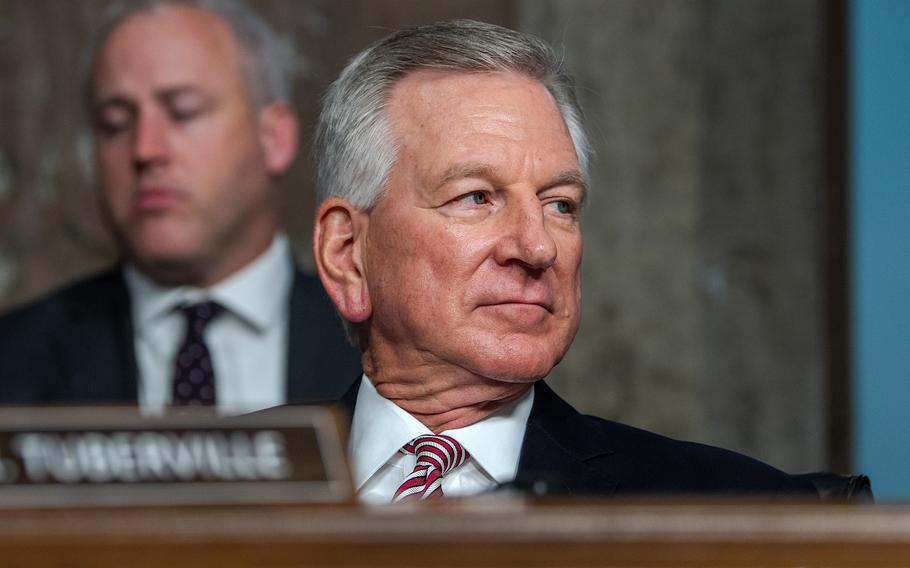
Army Lt. Gen. Ronald Clark’s promotion was confirmed by the Senate on Tuesday, Sept. 24, 2024, and he will now receive a fourth star and lead U.S. Army Pacific, which is based in Hawaii. (Mary Katzenberger/U.S. Army)
The Senate confirmed a fourth star for Army Lt. Gen. Ronald Clark on Tuesday just hours after Sen. Tommy Tuberville dropped a brief hold on his nomination to lead the service’s forces in the Indo-Pacific region, congressional records show.
Tuberville, R-Ala., imposed the block on Clark’s promotion earlier this month over concerns about the general’s role in keeping quiet Defense Secretary Lloyd Austin’s hospitalization after complications from surgery to treat prostate cancer. The senator dropped the hold after meeting Tuesday with Clark, said Mallory Jaspers, his spokeswoman.
“After a detailed discussion, Sen. Tuberville dropped his hold,” she wrote Wednesday in an email. “While there were certainly failures elsewhere, the senator is confident that Lt. Gen. Clark more than fulfilled his duties during the secretary’s hospitalization. Sen. Tuberville is thankful for Lt. Gen. Clark’s many decades of service to our nation and wishes he and his family the best in his new assignment.”
Tuberville drew fire from Democrats and Republicans last year when he blocked promotions of generals and admirals from February until December in protest of a Pentagon policy that allowed travel reimbursements for service members in locations with restrictions on reproductive health, including abortions. Tuberville’s hold ultimately stalled promotions for more than 400 top officers. The Pentagon never altered its policy.

Sen. Tommy Tuberville, R-Ala., dropped his block on Army Lt. Gen. Ronald Clark’s nomination to lead the service’s forces in the Indo-Pacific region. (Stars and Stripes)
Clark, 58, was one of dozens of top military officers confirmed for promotions on Tuesday by the Senate. The 36-year Army veteran has served as Austin’s top military aide since July 2022. He will replace Army Gen. Charlie Flynn as the chief of U.S. Army Pacific in Hawaii in the coming weeks.
Tuberville’s brief hold of his promotion came over concerns that Clark, one of Austin’s closest confidants, had been involved in the missteps when the secretary was hospitalized in January days after his prostate surgery. Austin’s condition and hospitalization status was not revealed to White House staffers and President Joe Biden for days, according to a February review of the incident. Austin and his staff faced condemnation from lawmakers for failing to report the defense secretary’s condition to the White House and Capitol Hill.
A summary of the Pentagon’s review of the incident did not name Clark but said Austin’s staff faced a difficult situation given health privacy laws. The review concluded Austin’s staff had no “ill intent” and made “no attempt to obfuscate” the secretary’s condition to the White House or the public.
Austin, 71, spent about two weeks in the hospital. Pentagon officials said there was never a lapse of military command and control during that period. In February, Austin apologized publicly to the American public, admitting he “did not handle this right.”
Clark is a 1988 graduate of the U.S. Military Academy at West Point, N.Y., who served as an infantry officer in Operations Desert Shield and Desert Storm, Operation Iraqi Freedom and the more recent Operation Inherent Resolve, the mission to defeat Islamic State militants in Iraq and Syria. He has spent much of his recent career based in Hawaii, serving as the chief of staff at U.S. Army Pacific, the commanding general of the 25th Infantry Division at Hawaii’s Schofield Barracks, and as the chief of staff of U.S. Indo-Pacific Command, according to his Army biography. He served as the commanding general of U.S. Army Central before becoming Austin’s top military aide.
In addition to Clark, the senate on Tuesday approved promotions for other top generals and admirals. Senators approved Air Force Lt. Gen. Steven Nordhaus’ promotion to four stars and becoming the next chief of the National Guard Bureau. They approved Navy Vice Adm. Alvin Holsey’s confirmation to four stars to lead U.S. Southern Command. They also approved Air Force Lt. Gen. Randall Reed’s promotion to four stars to lead U.S. Transportation Command. And the Senate confirmed Army Lt. Gen. Xavier Brunson’s promotion to four stars to command U.S. Forces Korea, records show.